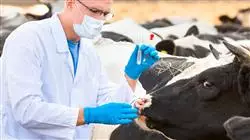University certificate
The world's largest faculty of veterinary medicine”
Introduction to the Program
If your objective is to broaden your skills set to include new paths of success and development, this is the course for you: a training that aspires to excellence"

This Postgraduate diploma in Epidemiology in Animal Health allows professionals to identify epidemics in animals. The program seeks to provide up-to-date and relevant information on the main viruses of the animal kingdom, as well as their spread among species and possible cures.
The first part of the program analyzes the impact of ecology on animal health based on an analysis of population ecology, environmental impact and the use of natural resources in the sustainable development for different farmed animal and wild species.
Thus, this program provides a compendium of up-to-date information for veterinary professionals. As such, the professional will have access to audiovisual material, with practical exercises and complementary readings in a completely digital format.
This program therefore presents professionals with a unique opportunity in the epidemiological field. It will broaden their knowledge and enhance their professional skills to prepare them for whatever the future has in store.
With a methodological design based on proven teaching techniques, this innovative course will use a range of teaching approaches to allow you to learn in a dynamic and effective way”
This Postgraduate diploma in Epidemiology in Animal Health contains the most complete and up-to-date scientific program on the market. The most important features include:
- The latest technology in online teaching software
- A highly visual teaching system, supported by graphic and schematic contents that are easy to assimilate and understand
- Practical cases presented by practicing experts
- State-of-the-art interactive video systems
- Teaching supported by telepractice
- Continuous updating and recycling systems
- Autonomous learning: full compatibility with other occupations
- Practical exercises for self-assessment and learning verification
- Support groups and educational synergies: questions to the expert, debate and knowledge forums
- Communication with the teacher and individual reflection work
- Content that is accessible from any fixed or portable device with an Internet connection
- Supplementary documentation databases are permanently available, even after finishing the course
Develop tools and competencies of a cognitive, communicative, and specific professional nature, for the evaluation, assessment, measurement, and solution of problems related to animal welfare”
Our teaching staff is made up of professionals from different fields related to this specialty. In this way we ensure that we deliver the educational update we are aiming for. A multidisciplinary team of professionals with expertise and experience in different areas, will efficiently cover the theoretical knowledge, but above all, will bring practical knowledge from their own experience to the course: one of the factors that makes this program unique.
This mastery of the subject matter is complemented by the effectiveness of the methodological design. Developed by a multidisciplinary team of e-learning experts, it integrates the latest advances in educational technology. This way, you will be able to study with a range of comfortable and versatile multimedia tools that will give you the operability you need in your education.
The design of this program is based on Problem-Based Learning: an approach that conceives learning as a highly practical process. To achieve this remotely, we will use telepractice learning: with the help of an innovative interactive video system, and learning from an expert , you will be able to acquire the knowledge as if you were facing the scenario you are learning at that moment. A concept that will allow you to integrate and fix learning in a more realistic and permanent way.
With the experience of working professionals and the analysis of real success stories, in a high-impact training approach"

Join the elite, with this highly effective educational specialization and open new paths to your professional progress"
Why study at TECH?
TECH is the world’s largest online university. With an impressive catalog of more than 14,000 university programs available in 11 languages, it is positioned as a leader in employability, with a 99% job placement rate. In addition, it relies on an enormous faculty of more than 6,000 professors of the highest international renown.

Study at the world's largest online university and guarantee your professional success. The future starts at TECH”
The world’s best online university according to FORBES
The prestigious Forbes magazine, specialized in business and finance, has highlighted TECH as “the world's best online university” This is what they have recently stated in an article in their digital edition in which they echo the success story of this institution, “thanks to the academic offer it provides, the selection of its teaching staff, and an innovative learning method aimed at educating the professionals of the future”
A revolutionary study method, a cutting-edge faculty and a practical focus: the key to TECH's success.
The most complete study plans on the university scene
TECH offers the most complete study plans on the university scene, with syllabuses that cover fundamental concepts and, at the same time, the main scientific advances in their specific scientific areas. In addition, these programs are continuously being updated to guarantee students the academic vanguard and the most in-demand professional skills. In this way, the university's qualifications provide its graduates with a significant advantage to propel their careers to success.
TECH offers the most comprehensive and intensive study plans on the current university scene.
A world-class teaching staff
TECH's teaching staff is made up of more than 6,000 professors with the highest international recognition. Professors, researchers and top executives of multinational companies, including Isaiah Covington, performance coach of the Boston Celtics; Magda Romanska, principal investigator at Harvard MetaLAB; Ignacio Wistumba, chairman of the department of translational molecular pathology at MD Anderson Cancer Center; and D.W. Pine, creative director of TIME magazine, among others.
Internationally renowned experts, specialized in different branches of Health, Technology, Communication and Business, form part of the TECH faculty.
A unique learning method
TECH is the first university to use Relearning in all its programs. It is the best online learning methodology, accredited with international teaching quality certifications, provided by prestigious educational agencies. In addition, this disruptive educational model is complemented with the “Case Method”, thereby setting up a unique online teaching strategy. Innovative teaching resources are also implemented, including detailed videos, infographics and interactive summaries.
TECH combines Relearning and the Case Method in all its university programs to guarantee excellent theoretical and practical learning, studying whenever and wherever you want.
The world's largest online university
TECH is the world’s largest online university. We are the largest educational institution, with the best and widest online educational catalog, one hundred percent online and covering the vast majority of areas of knowledge. We offer a large selection of our own degrees and accredited online undergraduate and postgraduate degrees. In total, more than 14,000 university degrees, in eleven different languages, make us the largest educational largest in the world.
TECH has the world's most extensive catalog of academic and official programs, available in more than 11 languages.
Google Premier Partner
The American technology giant has awarded TECH the Google Google Premier Partner badge. This award, which is only available to 3% of the world's companies, highlights the efficient, flexible and tailored experience that this university provides to students. The recognition as a Google Premier Partner not only accredits the maximum rigor, performance and investment in TECH's digital infrastructures, but also places this university as one of the world's leading technology companies.
Google has positioned TECH in the top 3% of the world's most important technology companies by awarding it its Google Premier Partner badge.
The official online university of the NBA
TECH is the official online university of the NBA. Thanks to our agreement with the biggest league in basketball, we offer our students exclusive university programs, as well as a wide variety of educational resources focused on the business of the league and other areas of the sports industry. Each program is made up of a uniquely designed syllabus and features exceptional guest hosts: professionals with a distinguished sports background who will offer their expertise on the most relevant topics.
TECH has been selected by the NBA, the world's top basketball league, as its official online university.
The top-rated university by its students
Students have positioned TECH as the world's top-rated university on the main review websites, with a highest rating of 4.9 out of 5, obtained from more than 1,000 reviews. These results consolidate TECH as the benchmark university institution at an international level, reflecting the excellence and positive impact of its educational model.” reflecting the excellence and positive impact of its educational model.”
TECH is the world’s top-rated university by its students.
Leaders in employability
TECH has managed to become the leading university in employability. 99% of its students obtain jobs in the academic field they have studied, within one year of completing any of the university's programs. A similar number achieve immediate career enhancement. All this thanks to a study methodology that bases its effectiveness on the acquisition of practical skills, which are absolutely necessary for professional development.
99% of TECH graduates find a job within a year of completing their studies.
Postgraduate Diploma in Epidemiology in Animal Health
.
Epidemiology in animal health is the branch of epidemiology dedicated to the study of diseases affecting animals and their relationship with the environment in which they live and reproduce. This discipline is responsible for the analysis and investigation of the distribution, risk factors and causes of animal diseases, in order to prevent and control them.
Epidemiology in animal health covers several areas, such as disease identification and monitoring, implementation of vaccination and control programs, and epidemiological surveillance to detect outbreaks and epidemics. It is also concerned with assessing the effects of environmental factors, such as climate and geography, on the spread of disease.
Professionals working in animal health epidemiology include veterinarians, biologists, microbiologists, epidemiologists and public health experts. These specialists cooperate with health authorities and other professionals involved in animal care, from diagnosing and treating diseases to implementing preventive measures and controlling their spread.
This online academic program seeks to provide students with a comprehensive training in animal health epidemiology. Students will learn about basic concepts in animal epidemiology, its history and evolution, and the importance of its application in animal health. In addition, they will be taught about the design and analysis of epidemiological studies in animals, from population selection to applied statistical methods. The program will also focus on pathologies and diseases in animal health, including diagnostic tests, zoonotic diseases and prevention and control techniques being available in the animal population. Finally, research and practical applications of epidemiology in animal health will be discussed, as well as ethics and responsibility in animal epidemiology research. Learning will take place through theoretical and practical modules, which will include exercises, teamwork, discussions and case studies.







